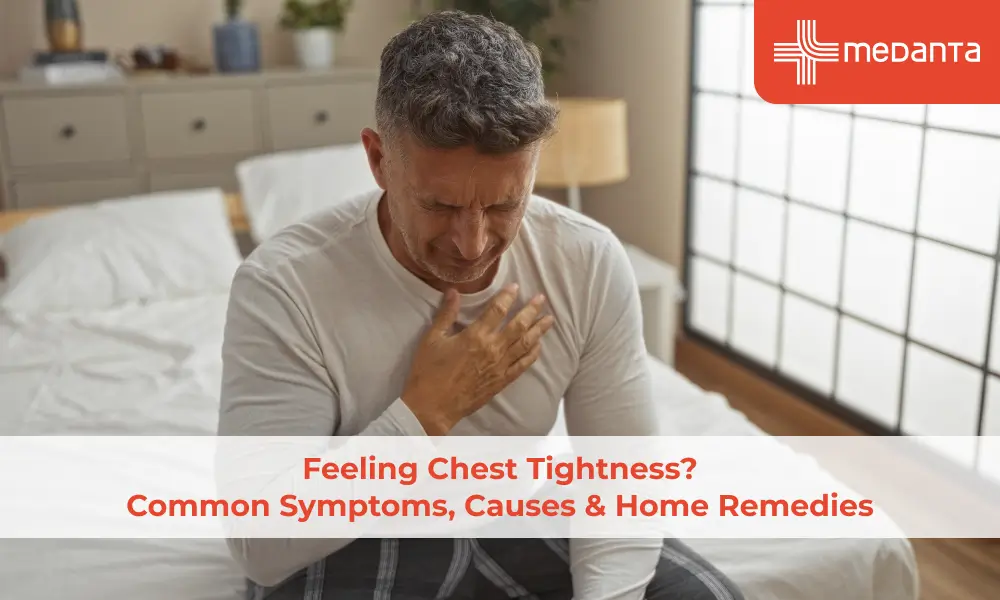Feeling Chest Tightness? Common Symptoms, Causes & Home Remedies

TABLE OF CONTENTS
People need to understand what causes chest pain before trying home remedies. Statistics show that millions of people need emergency care due to chest pain yearly. The sudden feeling of pressure or tightness in your chest can be frightening.
The sensation of chest tightness resembles squeezing, heaviness, or fullness in the chest area. Your chest's uncomfortable feeling can stem from simple stress and anxiety to serious heart conditions. Most people's first thought jumps to heart problems the moment they feel chest tightness. But chest discomfort doesn't always mean a medical emergency. The root causes range from simple muscle strain to coronary artery disease. Your family history, excess weight, poor diet choices, and smoking can increase the risk of heart-related chest tightness.
This article explains the mechanisms behind chest heaviness and helps you recognise warning signs that simple remedies might address. Understanding the distinction between harmless symptoms and those needing immediate medical attention could be life-saving, especially if you experience occasional discomfort or persistent chest tightness.
What Is Chest Tightness and How Does It Feel?
The sensation of chest tightness creates pressure, squeezing, or fullness in your chest area. Many people describe it as a heavy weight on their chest or a crushing sensation. The pain varies from sharp to dull, burning to aching, and sometimes feels like stabbing. This discomfort lasts anywhere from minutes to months and often spreads to your jaw, back, neck, shoulders or arms. Physical activity typically makes the pain worse, while rest brings relief.
Medical & Non-medical Causes of Chest Tightness
Several factors cause chest tightness, including both cardiac and non-cardiac sources:
Cardiac causes:
Coronary artery disease restricts blood flow through narrowed heart arteries
A heart attack blocks blood circulation to the heart muscle completely
Pericarditis inflames the sac around the heart
Non-cardiac causes:
Gastroesophageal reflux disease (GERD) is the commonest cause of chest pain
Respiratory conditions like asthma, pneumonia, or pulmonary embolism
Anxiety or panic attacks tighten chest muscles
Musculoskeletal issues strain chest muscles from coughing or injury
Symptoms That Could Indicate a Heart Issue
Watch for these warning signs with chest tightness:
Central chest pressure or squeezing that lasts several minutes
Pain that spreads to arms (particularly left), back, neck, jaw, or stomach
Breathlessness with or without chest discomfort
Cold sweats, nausea and lightheadedness appear as additional symptoms
Unusual fatigue, irregular heartbeat, or feelings of doom surface

Natural Remedies for Mild Chest Tightness
These approaches help relieve non-cardiac chest discomfort:
Deep breathing exercises relax chest muscles
Warm compresses ease muscle tension
Regular hydration throughout the day
Gentle stretching improves circulation
When to Seek Medical Help Immediately
Call emergency services if you notice:
Chest pain persists beyond 15 minutes
Sudden or severe pressure occurs with breathing difficulties
Chest discomfort combines with jaw/arm pain, sweating, or nausea
Rest or medication fails to improve pain
Fainting, severe sweating, or extreme anxiety accompany chest pain
Conclusion
Millions of people worldwide experience chest tightness. The squeezing sensation can be frightening, but it doesn't always mean you're having a heart attack. Your body's signals become easier to interpret once you understand them better.
Many conditions besides heart problems can cause this discomfort. That heavy feeling in your chest might stem from acid reflux, strained muscles, anxiety or lung issues. A combination of chest pain with jaw discomfort, sweating, or arm numbness needs medical attention right away.
Simple home remedies like warm compresses or gentle stretches can ease mild discomfort from stress or muscle tension. Your mind and body both relax when you practise deep breathing exercises to release tight chest muscles.
Listen to your body's signals. Emergency services should be called if chest pain persists beyond 15 minutes, particularly with other worrying symptoms. Your health is too important to make guesses about what's happening inside. Most cases of chest tightness turn out harmless, but knowing how to tell minor discomfort from serious warning signs helps you protect yourself effectively.
FAQs
Can chest tightness be due to anxiety?
Anxiety causes chest tightness quite often. Your body releases hormones like adrenaline in stressful moments. This triggers a "fight-or-flight" response that creates muscle tension in your chest. The tension feels like sharp, stabbing pain or pressure in your chest area. Anxiety-related chest pain usually comes on suddenly with symptoms like:
Racing heartbeat or palpitations
Shortness of breath
Dizziness or tingling fingers
Sweating or temperature changes
What helps relieve chest tightness naturally?
Several home remedies can help with mild chest discomfort not linked to heart problems. Deep breathing exercises relax tense chest muscles. A warm compress on your chest eases muscle tension and pain. Regular hydration helps maintain chest comfort. Relaxation techniques like meditation or progressive muscle relaxation can break the cycle of anxiety and chest tightness.
Is chest tightness a sign of a heart attack?
Chest tightness might signal a heart attack, especially when you feel pressure, squeezing or aching in your chest for more than 15 minutes. Heart attack pain often spreads to your arms (usually left), jaw, neck, back or stomach. Watch for other signs like cold sweats, nausea, lightheadedness, and breathing trouble. Women's symptoms can be less obvious - unusual fatigue, back pain, or jaw discomfort without much chest pain.
Should I go to the ER for chest pressure?
Rush to emergency care if you experience:
Continues beyond five minutes without improving with rest
Appears with shortness of breath, sweating or nausea
Spreads to your jaw, arm, neck or back
Feels crushing or extremely uncomfortable
How long does mild chest tightness last?
Chest pain from anxiety usually goes away within 20-30 minutes. Pain from acid reflux or muscle strain might last longer. You need immediate medical help if the pain gets worse or lasts more than 15 minutes.






